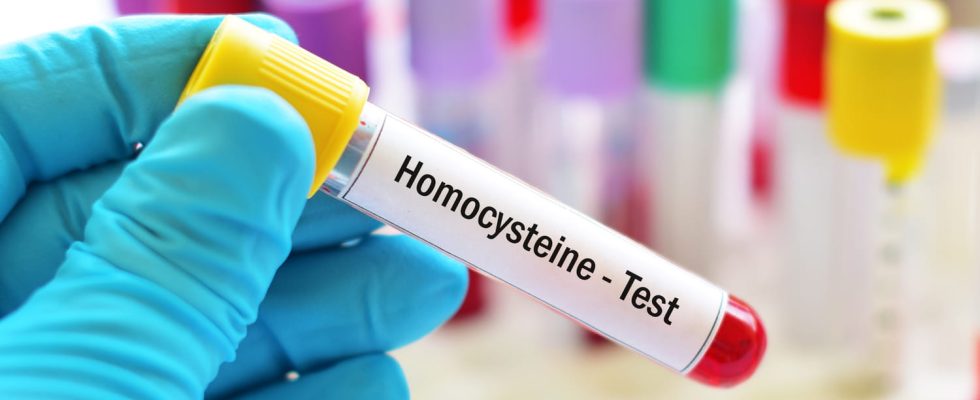Homocysteine is an amino acid that is produced naturally by the body during protein metabolism. High levels of homocysteine in the blood can damage blood vessel walls, increasing the risk of blood clots and cardiovascular disease.
What is homocysteine?
Homocysteine is a amino acid that is produced naturally by the body during protein metabolism. “Normally, homocysteine is converted to methionine or cysteine thanks to the presence of certain vitamins such as vitamin B6, vitamin B9 (folic acid) and vitamin B12explains Dr. Florian Scherrer, medical biologist. However, when homocysteine levels are high in the blood, it may be a sign that this conversion is not happening efficiently“. Elevated homocysteine levels may be associated with an increased risk of cardiovascular diseases, neurodegenerative diseases or miscarriages in pregnant women. “High homocysteine levels can be caused by several factors, including smoking, excessive alcohol consumption, poor diet, intestinal absorption disorders…Treatment for hyperhomocysteinemia may include B vitamin supplementation and/or dietary and lifestyle changes“. The homocysteine assay is performed to assess the risk of developing cardiovascular disease. It is also used to diagnose deficiencies in vitamins B12, B6 and B9 (folic acid), which are needed to metabolize homocysteine.
What is the role of homocysteine?
Homocysteine is involved in several important biological processes such as methionine metabolism. “Methionine is an essential amino acid important for protein synthesis and regulation of the levels of certain hormones, continues the biologist. She is also involved in DNA synthesis, which is essential for tissue growth and repair“.
Finally, homocysteine can affect blood clotting by increasing the formation of clots. However, elevated levels of homocysteine in the blood may be associated with an increased risk of cardiovascular diseases, neurodegenerative diseases or miscarriages in pregnant women. “It is therefore important to maintain adequate homocysteine levels through a balanced diet and, if necessary, a B vitamin supplementation.
Homocysteine and vitamin B 12
Vitamin B12 plays a crucial role in the regulation of homocysteine levels in the blood. “Vitamin B12 is necessary for the conversion of homocysteine into methioninean essential amino acid for protein synthesis and regulating the levels of certain hormones“, continues the doctor. When the body lacks vitamin B12, there can be a buildup of homocysteine in the blood, which can increase the risk of cardiovascular disease.“. Vitamin B12 supplementation may help reduce homocysteine levels in people who have vitamin B12 deficiencies or who have high levels of homocysteine in the blood.
Do you have to be fasting for the blood test?
“Yes, it is usually recommended to be on an empty stomach before the blood test to measure homocysteine levels, replies Dr. Scherrer. This provides more accurate and reliable results“. Indeed, eating before the blood test can affect the measurement of homocysteine levels.
What causes an increased level of homocysteine?
There are several possible causes for an increased level of homocysteine in the blood. The first is a B vitamin deficiency. “Vitamins B12, B6 and B9 (folic acid) are necessary for the conversion of homocysteine into other useful amino acids in the body, says the specialist. A deficiency in one of these vitamins can therefore lead to an accumulation of homocysteine in the blood.“. Other cause, a poor diet : “Diets that lack essential nutrients like B vitamins can raise blood homocysteine levels“. Some medications can also disrupt homocysteine metabolism, thereby increasing blood homocysteine levels. “Some people may also have a genetic mutation which affects homocysteine metabolism, which can lead to high levels of homocysteine in the blood“. THE smoking is another cause. It can affect blood homocysteine levels by disrupting the function of B vitamins. kidney disease can disrupt homocysteine metabolism and lead to elevated levels in the blood.
Pricing and Reimbursement of Homocysteine Analysis
“The analysis of homocysteine is not supported in Franceconcludes our interlocutor. Its price is around 60 euros In France”.
Thanks to Dr. Florian Scherrer, Synlab France Quality Director and medical biologist at Synlab Barla Laboratory in Nice.
